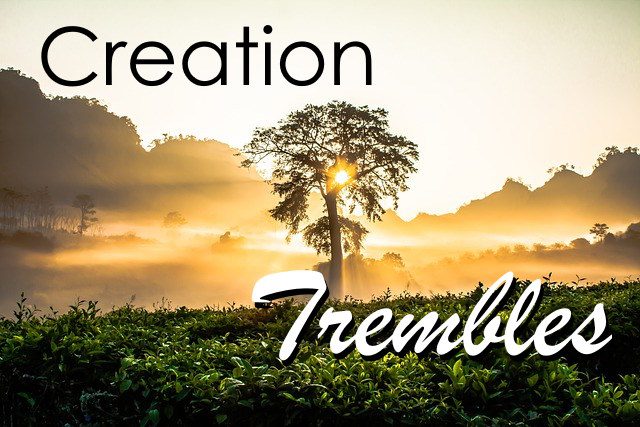A congregation of the United Church of Canada

Yr A ~ Creation 2 ~ Psalm 114
What do we mean by creation? One aspect is to think about the natural world, the planet we share, and to raise theological issues about sustainability, respect, resources, stewardship, and greed. We can talk about the environment, the physical world, and celebrate the wonders that it holds.
Another aspect is to think about the act of creation, and focus on God. While it makes for a good visual, I don’t for one instant imagine that a humanoid figure with a white beard physically shaped the stars and planets and all that is. There’s a great cartoon that shows God as an old white guy, standing at a table, rubbing plasticine into long tubes, saying, “Snakes are so easy to make!”
So what do we mean by the act of creation? The big bang maybe? Did it just happen? Was it caused? What banged together? These are big scientific questions, but they’re also spiritual questions.
For me creation is about the existence of life that can in many ways be explained scientifically but also holds a mysterious, miraculous sense because the complexity and interrelatedness and interconnectedness of it all inspires awe and wonder, and we sense that more than just being a happy accident we are somehow the product of a loving intention. We give that mysterious intentionality the name God, and we celebrate how we are part of it all.
How can we talk about God as creator without falling into troublesome anthropomorphism? How do we acknowledge the remarkable understandings that science has given us and at the same time acknowledge that there’s more to it than just science? And how do we find language that can speak to the theological side without leaving our brains at the door?
Today we’re going to explore some of that language – and probably the best language to use to talk about God is poetry – and the best poetry in the bible is found in the Book of Psalms, which is more or less a hymn book – which means poetry and music in the service of speaking of spiritual things. Poetry and music have the potential to help us access deep truths and meaning that science can never get to. Today we’re looking at Psalm 114. It’s a psalm that recalls the Exodus and tries to offer a sense of how momentous a thing it was – and how awesome was the God who inspired and guided it.
1 When Israel went out from Egypt, the house of Jacob from a people of strange language,
2 Judah became God’s sanctuary, Israel God’s dominion.
In other words, when the Exodus happened, when Moses and the Jews escaped from Pharaoh in Egypt, they went to a region called Judah which became God’s sanctuary, and God was with them in a special way. That’s pretty incredible stuff! How do you think they felt?
The Israelites were once under the rule or domain of Pharaoh – now they’re under God’s domain. That’s the story of the Exodus. For the Israelites this was an epic, epoch-making event, and they knew deep in their hearts that God was at the centre of it. Now, how do you tell that story? How do you describe something so ginormously life-changing for you and your people? You write songs! – because the metaphors in poetry and songs give you the potential to express deep truths in engaging and effective ways. So, when that momentous action happened how did not just the people but the planet react?
3 The sea looked and fled; [the river] Jordan turned back [on itself and flowed the other way].
4 The mountains skipped [bounded, danced, frolicked!] like rams, the [little] hills like lambs.
5 Why is it, O sea, that you flee? O Jordan, that you turn back?
6 O mountains, that you skip like rams? O hills, like lambs?
Why? Why? Here’s why!
7 Tremble, O earth, at the presence of the Lord, at the presence of the God of Jacob,
8 who turns the rock into a pool of water, the flint into a spring of water.
How awesome was the Exodus? Well, the way they tell it, it rocked their world! And this psalm was one of the ways they tried to express their overwhelming gratitude and awestruck-ness.
7 Tremble, O earth, at the presence of the Lord, at the presence of the God of Jacob.
Trembling in awe before God.
Tremble is a very complex Hebrew word. Its field of meaning is really vast. It can mean:
to twist or whirl, to dance, to writhe in pain or fear;
to hope, look, rest, shake, stay, tarry, trust, wait patiently, be wounded.
In English to tremble means: To shake involuntarily, as from excitement, anger, fear, or anxiety; to quake, vibrate, or quiver.
The point here is not to make us afraid of God but to remind us that God is all around and God is truly awesome and awe-full. Remember, that phrase “the fear of God” actually means to be ‘awestruck’ more than it means to be scared. No doubt, such tremendous awe unsettles one, turning your legs to jello, perhaps sending you to your knees, causing some fear – but it’s a positive, exhilarating, dynamic ‘fear’, not a debilitating, negative one.
So often we are so casual about how we toss God’s name around, or shrug off the whole church, or faith, or spirit thing because it feels like no big deal. When the name of God, or the presence of God, is said or revealed the appropriate response is not a shrug – it’s trembling!
The whole earth trembles in God’s Presence, not in fear – in awe! The trembling imagery reminds us that God is all around and all-encompassing. God’s Presence is the mysterium tremendom!
Author and poet Annie Dillard writes, “Does anyone have the foggiest idea of what sort of power we so blithely invoke? Or, as I suspect, does no one believe a word of it? The churches are children playing on the floor with their chemistry sets, mixing up a batch of TNT to kill a Sunday morning. It is madness to wear ladies’ straw hats and velvet hats to church; we should all be wearing crash helmets. Ushers should issue life preservers and signal flares; they should lash us to our pews.”
1 Thessalonians 5:17 tells us to “pray continually.” Maybe we ought to add Psalm 114:7 and say “tremble continually!”
We have a Holy Week hymn that says “Sometimes it causes me to tremble! Tremble! Tremble!” Sometimes? If trembling is the appropriate response to God’s presence and we’re always, always, always in God’s presence because God is everywhere and always, then it follows that we should always be trembling! Maybe we just don’t notice?
Is it possible we’re so immersed in God’s Presence that we don’t even realize it? This is one of big reasons we gather in ways like this – in worship – because it helps us notice – and that’s good. How different might the world be if we noticed that awe and had a little trembling in our lives all the time?
7 Tremble, O earth, at the presence of the Lord, at the presence of the God of Jacob.
Nature imagery is a wonderful way to talk about God. It’s effective because nature is both ordinary and all around us, and at the same time is full of mystery and wonder. The human mind trying to grasp the depths of the sea, or the immensity of a mountain, is a lot like trying to fathom God. For all our scientific advancements and technology there are still parts of the earth that we’ve never been able to explore. It’s very humbling. So’s theology!
So this idea that the seas ran away, that rivers reversed, that mountains leapt and skipped around – that’s a poet (a songwriter) trying to convey that the greatest, most mysterious, most powerful things on earth pale in comparison to the grandeur and awesomeness of the Holy Mystery we call God. The most powerful things on the planet tremble in God’s presence. And if a mountain trembles how much more so might we?
In our praise song today we sang:
If the stars were made to worship, so will I
If the mountains bow in reverence, so will I
If the oceans roar your greatness, so will I
Curiously, even though these are fantastic nature images, this text has virtually nothing to do with nature! It’s a text about the awesome, wondrous power of God’s Holy Presence. It uses powerful nature images, but that doesn’t mean that powerful things in nature are God flexing God’s muscles. It’s really important to underline this.
Our news these days is filled with terrible stories of the awful power of nature. Floods like in Libya, hurricanes in the Maritimes, wildfires in the north, and BC, and Quebec, earthquakes like the one in Morocco last week – nature can be so beautiful, and also so destructive and deadly. Now, I shouldn’t have to say this but I’m going to just to be crystal clear. God has nothing to do with causing or sending these things. One of the worst phrases that ever caught on was calling natural disasters an “act of God”. Ridiculous! And really problematic theologically. I get why the phrase came to be – it’s for the same reason the psalmist wrote this way – because we’re talking about a power that is beyond human comprehension.
And don’t get me started about those revoltingly misguided preachers who stand in pulpits and declare that some disaster is God’s judgment on some group’s supposed sinfulness. (It’s never their own group’s sinfulness, of course!) Those preachers and that theology is hateful, it’s wrong, and unfortunately in addition to innocent people being hurt by it, we get tagged with it by association.
Now, this is not to say that God has nothing at all to do with nature. On the contrary, we affirm that God is everywhere and always. So while God doesn’t cause hurricanes, or floods, or fires, or earthquakes – God is absolutely present in those places. God is present as people help. God is present as people mourn. God is present as people rage. God is present as people recover and rebuild. God is present as people pray for those who suffer.
I have no spiritual explanation for why disasters happen. Science can help us with that. Acknowledging the presence of God, and trembling at God’s awesome holiness in the midst of the trouble doesn’t make the hurt go away – but it can lead us to deeper questions. Like why are we so prone to self-interest most of the time but in times of trouble our “greater angels emerge”? Why do our economic systems make it so that poorer people have to live in flood plains? Why are the homes in some wealthier countries and neighbourhoods still standing while the poorer countries and neighbourhoods are flattened? No, nature doesn’t pick and choose, and yes some rich people lose everything too, but disasters always impact the poor in vastly disproportionate numbers. That ought to make us ‘tremble’ – with anger!
These are justice questions. As people of faith we are called to ask them.
I think it’s probably appropriate that we’re left with questions. Beware any religion that claims to have all the answers. The world we live in is beautiful and terrible. The God we know is awesome and awe-full. When faced with these things that eclipse our ability to comprehend, perhaps the best we can do is to stand in that space and wonder, and tremble – and remember what, or who, we’re swimming in. Creation, and the One we call Creator, are utterly perplexing and humbling for us.
Sometimes, it causes me to tremble. Tremble. Tremble.
7 Tremble, O earth, at the presence of the Lord, at the presence of the God of Jacob.
For surely, God is in this place. Tremble. Amen.



